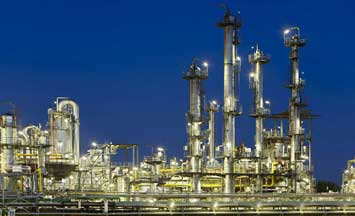Use of Heat Exchangers in Oil Refineries is widely used for purposes such as temperature control, energy recovery and improving product quality in various processes. Petroleum refineries involve a complex set of processes to separate the components of crude oil and produce various petroleum products (gasoline, diesel, jet fuel, kerosene, etc.).
Areas of Use of Heat Exchangers in Oil Refineries
- Heat Transfer and Cooling: Many processes in oil refineries occur at high temperatures. Heat exchangers provide cooling processes by transferring the heat generated in these processes. For example, heat exchangers are used during the distillation of petroleum products, for the separation of crude oil, or for temperature control in catalytic precipitator reactions.
- Condensers: Some of the refinery processes require the conversion of gas phase components to the liquid phase. In these processes, exchangers promote condensation of gases by enabling liquefaction.
- Heat Recovery: Waste heat is generated during many processes in oil refineries. Heat exchangers recover this waste heat and provide reusable energy in different processes or heating systems. For example, the hot outlet fluid of one process can be used to heat the inlet fluid of another process.
- Cooling of Petroleum Products: Petroleum products (gasoline, diesel, kerosene, etc.) produced in the refinery must be cooled during storage or transportation. Heat exchangers play an important role in the systems used to cool these petroleum products.
- Washing and Separation Processes: Some petroleum refining processes include processes such as washing products or separating their components. Heat exchangers are also used in these processes.
- Continuous Process Control: Exchangers provide continuous process control in oil refineries. Factors such as temperature, pressure and flow control are critical to product quality and process efficiency.
In oil refineries, heat exchangers reduce energy costs by increasing the efficiency of the facility, reduce environmental impact and ensure the safe and smooth operation of processes. Therefore, heat exchangers are widely used in the oil industry.
Oil Refinery Applications
For Use of Heat Exchangers in Oil Refineries
- Desalination process
- Purification of wastewater
- Desulfurization process
 Benefits of Using Heat Exchangers in Oil Refineries
Benefits of Using Heat Exchangers in Oil Refineries
- Wide selection of plates and gaskets resistant to aggressive process fluids
- Ease of cleaning and installation
- Having welded and unwelded plate parts
- Reducing the possibility of leakage with limited gasket usage design
- Flexible structures to meet variable process needs
- Up to 97% heat recovery
- Efficient work
- Low costs by reducing the heat transfer area you need thanks to high thermal efficiency
- Low fluid operating costs due to low initial fluid requirements
- No need for complex maintenance such as X-Ray, ultrasonic and other non-destructive testing procedures in maintenance
- While the exchanger operates safely, the need for inspection and maintenance is reduced due to the corrosion-resistant material
- Reduces costs as heat exchanger life is long
- No moving parts eliminates vibration and reduces maintenance
- Reducing pollution ensures high thermal efficiency while reducing maintenance and operating costs
 Stainless Steel Products
Stainless Steel Products Mixing
Mixing Pumps
Pumps Heat Exchangers
Heat Exchangers System Solutions
System Solutions